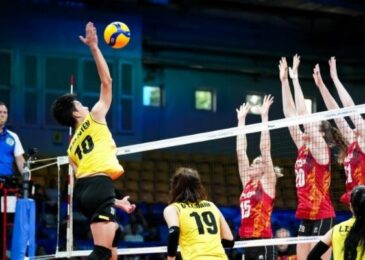By Christine Mooberry, Head Volleyball Coach, Montreat College, USA Volleyball CAP Level II Article
It is crucial for athletes to have a sense of ownership and pride within their program. Building ownership takes time and requires the establishment of specific standards. When players take ownership of the program, they become responsible for meeting expectations and raising the overall strength of the team.
Bạn đang xem: Training Ownership and Work Ethic in Your Athlete to Improve Your Program
Players are often drawn to a program because they want to be part of something greater than themselves. They desire to be challenged and appreciate a coach and teammates who provide constructive feedback. In our program, we ensure that expectations for our college student-athletes are clearly communicated. They know what is expected of them both on and off the court, as individuals and as team players. This accountability fosters sacrifice for the team, better decision-making, improved performance, and the passing on of expectations to new members.
Not every athlete who enters our gym is cut out to be part of our program. Training leadership and work ethic in our current players sets a higher standard and helps us identify those who will thrive in our program. To evaluate their performance objectively, we have implemented a system of skill and fitness testing. By providing athletes with clear expectations and ranking them based on their performance, we can make informed decisions and address any concerns in a transparent manner.
Xem thêm : U.S. Men’s Volleyball Team Faces Tough Loss to Brazil in VNL
Setting high standards extends beyond evaluating athletes’ skills. We also establish clear expectations during practice and games. Verbalizing these standards and implementing consequences for failure to meet them has proven effective. For instance, we introduced the rule that “no ball drops without a body,” meaning every player must make an effort to go for the ball. This not only improved our defense but also fostered a relentless pursuit mentality among our players. They take ownership of their performance and push each other to never give up.
Goal setting is another way we encourage ownership and performance improvement. By striving for specific percentages in practice and games, we motivate players to achieve their targets. We explain to them why these goals are important and how they contribute to success. For example, if players achieve seven out of ten first kills on serve receive, they are allowed to rotate. This system helps them focus and take responsibility for their performance.
In addition to skill-based ownership, we empower our setters to take ownership of strategy and decision-making. We encourage them to assess the opposing team’s strengths and weaknesses, run plays to exploit the block, and communicate effectively with their teammates. By giving them this responsibility, we enable them to develop a deeper understanding of the game and take ownership of their success.
Mental toughness is also crucial in our program. We stress the importance of making wise yet aggressive decisions and give our players the tools to do so. Whether it’s communicating on defense or serving strategically, we emphasize the importance of owning their decisions and actions.
Off the court, we expect our athletes to maintain high standards. They are encouraged to excel academically, challenge each other to make wise time management decisions, and take care of their bodies by making healthy choices in the cafeteria. Respecting teammates, opponents, and taking responsibility for their actions are core values we promote. By instilling these character traits, we foster a culture of respect and responsibility within our program.
Xem thêm : Beach Update: World Tour Comes to Cincinnati
Setting high yet attainable standards, clearly communicating expectations, and establishing practice and game standards of 100% effort are all critical in developing leadership, ownership, and pride within our program. Some players will naturally rise to the occasion and inspire others to do the same, ultimately improving the overall level of the team. These standards also help identify individuals who are genuinely committed to the program. In the end, it’s a win-win situation that results in a stronger team composed of dedicated, skilled, and passionate athletes.
FAQs
-
Q: How do you establish ownership within your program?
- A: Ownership within our program is built over time by setting specific standards and clearly communicating expectations to the athletes.
-
Q: How do you evaluate the performance of athletes?
- A: We use a system of skill and fitness testing to objectively evaluate athletes’ performance and rank them based on their results.
-
Q: How do you encourage mental toughness in your players?
- A: We stress the importance of making wise yet aggressive decisions and provide our players with the tools to do so, both on and off the court.
Conclusion
Developing ownership and work ethic in athletes is crucial for the success of any program. By setting high standards, fostering a culture of accountability, and encouraging goal setting, coaches can empower their players to take ownership of their performance. This not only raises the overall level of the team but also creates a sense of pride and accomplishment among the athletes. When athletes take ownership of their development, they become more dedicated, skilled, and committed to the program, resulting in a stronger and more successful team. Visit Alpinetgheep to learn more about our approach to athlete development.
Nguồn: https://alpinetgheep.com
Danh mục: Volleyball


